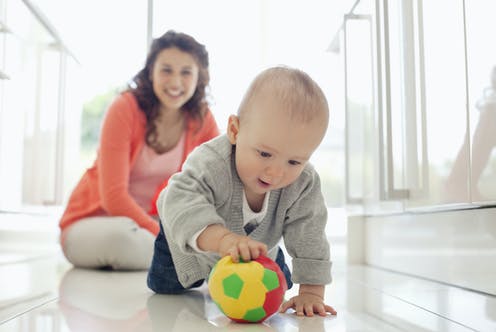
When people set personal fitness goals and establish their physical exercise routines, there’s a group of cuddly individuals that is often left out – infants!
Historically, infant active movement has been perceived as a personality characteristic. It’s assumed that infants are plenty active on their own, without needing adult intervention to encourage movement.
However, research is revealing that the choices, behaviors and everyday habits of adults have a big influence on how much infants move.
I’m a physical activity teacher and researcher. For the past five years I’ve conducted several studies exploring infant movement, seeking to identify what supports the development of lifelong physical activity habits.
I’ve learned that many parents and other caregivers want to encourage infants to actively play and move. However, they often don’t know for sure how much physical activity an infant needs, nor do they often recognize how their own behaviors might be limiting an infant’s physical activity. Fortunately, there are several easy – and fun – ways to add more physical activity to an infant’s daily life.
Table of Contents
Why infants need movement – and how much
Study of infant movement is a relatively new field, so there is still a lot to learn. However, one of the field’s foundational studies was published in 1972, and it found that increased infant physical activity can improve motor development. More recent research shows that increased infant movement can improve bone health and personal-social development – skills related to improving their independence or interacting with others, such as feeding themselves or waving goodbye.
The World Health Organization suggests that infants should be physically active several times a day, especially through interactive floor-based play. Similarly, the American Academy of Pediatrics recommends opportunities for interactive play throughout the day, along with at least 30 minutes of “tummy time” with an adult – which I’ll talk more about below.
Yet half the parents participating in our research reported that they hadn’t heard of these recommendations and did desire more specific guidelines on encouraging active play.
What are the barriers?
While research is ongoing, I and other researchers have identified three major barriers to infant active movement: screen time, restrictive devices and “gendered play” – gender-related stereotypes, beliefs and practices in relation to how children play.
The American Academy of Pediatrics and other organizations discourage allowing infants any screen time other than video chatting. However, a recent review found that children ages 0 to 2 years may be getting between 36 and 330 minutes of screen time per day. A 2019 analysis of data gathered between 2008 and 2010 found that children’s screen time increased from 53 minutes a day at age 1 to more than 150 minutes per day by age 3, which suggests that screen time habits begin taking shape at very early ages.
Furthermore, the World Health Organization suggests that infants should spend no more than one hour at a time in a restrictive device. Yet many adults overuse car seats, strollers, high chairs or other “containers” that constrain movement. For instance, in a 2018 study of child care centers in the U.S., Canada and Australia, only 38% to 41% of the facilities followed this WHO guideline.

JGI/Jamie Grill via Getty Images
Research into adult physical activity consistently shows that males are more active than females, regardless of age. Our research suggests this gap may begin during infancy and be related to gendered play.
In our 2020 study exploring infant motor development in relation to parents’ promotion of play, we found that parents of male infants more often encouraged play that promoted gross motor skills: movement involving the large muscles that support activities like walking, running or kicking. Parents of female infants more often made statements that promoted fine motor skills, which involve smaller movements of the hands and arms and support activities like reaching and grasping. We found that females had significantly higher fine motor skills than male.
We’ve documented additional barriers as well, including time spent eating, tending to the infant’s sleeping schedule or other care needs; a need to baby-proof surroundings; or weather and other environmental concerns.
How to support infant movement
Fortunately there are many ways to break down these barriers – and none requires buying expensive baby gear.
-
Encourage tummy time: Two to three times a day, place an awake infant on their tummy for a few minutes, and then play and engage with them. This is the primary method of supporting movement for infants who are not yet mobile.
-
Explore movement together: Doing activities that help infants learn about movement, such as bouncing the child on one’s lap and singing and playing patty-cake or peekaboo, can encourage infants to move. Infants also watch what the adults around them do – including how active they are! In one of our studies, many mothers reported being physically active themselves, but few realized it was important to role-model regular physical activity for infants.
-
Create safe play space: As infants learn to move and get better at controlling their feet and hands, even normal household objects, such as small items they can shove into their mouths and choke on, become potential hazards requiring adult intervention. Protect them by clearing clutter and removing potentially dangerous objects from a space that’s at least 5 feet by 7 feet.
-
No equipment? No problem!: It doesn’t take new or costly gear to encourage infant movement. Use things around the house: Pillows can be piled into a “mountain” to crawl over. Mixing bowls and measuring cups can double as toys. Adults can also turn their own bodies into an infant climbing gym. For example, sit on the floor with legs spread out and encourage the infant to pull themselves up or crawl over them.
-
Get outside: National guidelines recommend taking infants outside two to three times per day, weather permitting. Our research suggests children are more physically active when they play in parks, playgrounds and other open areas that allow for gross motor activities like crawling and walking. The benefits of active outdoor play may also include improved self-control, attention, communication and social development.
To help motivate us, my family is taking the 1,000 Hours Outside challenge, a project encouraging both kids and adults to spend at least as much time outdoors as we do staring at screens.
[Over 150,000 readers rely on The Conversation’s newsletters to understand the world. Sign up today.]
Finally, it need not be up to parents alone. Research has linked social support by siblings and peers, child care providers and teachers with increased physical activity in children.
Trust me: As both a physical activity researcher and a working mother of three, including an 11-month-old just learning to walk, I can attest that when adults and older children play with my baby, it gives me an opportunity to accomplish something on my to-do list, and provides my infant with more opportunities to enjoy moving.
![]()
Danae Dinkel receives funding from the National Institutes of Health.























